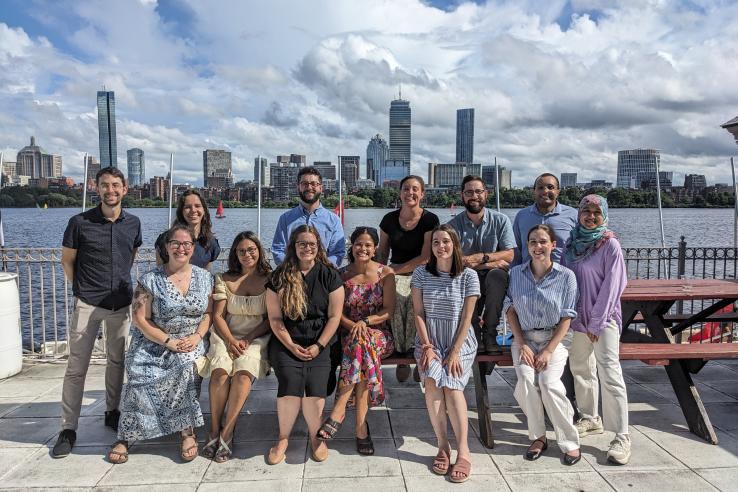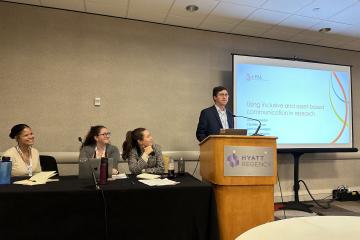
J-PAL North America’s DEIWG: Lessons and reflections from 2023-24

This is the first of an annual series of blog posts about J-PAL North America's DEI efforts. Each year, we will reflect on achievements, shortfallings, and lessons learned from the year and share our goals for the future. We invite you, our readers, to ask questions, share feedback, and pursue learning with us.
J-PAL North America’s mission is to reduce poverty in the region by ensuring policy is informed by scientific evidence. We aim to advance this goal in accordance with our staff core values, including embracing equity and pursuing learning. We recognize that in order to create a more equitable future in North America, we must also foster it within our organization.
In 2017, J-PAL North America staff founded our Diversity, Equity, and Inclusion Working Group (DEIWG), which has since worked to advance its many goals.
These efforts have led to concrete changes in our hiring practices, organizational priorities, funding principles, and more. While we’re incredibly proud of the work we’ve done, we know there is always more to do. By sharing our experiences, lessons learned, and plans for the future, we aim to both hold ourselves accountable to the goals we set, and continue conversation with you, our J-PAL community.
Reflecting on the past year
Three of our priorities from the past academic year were to improve systems of transparency and accountability within J-PAL North America, increase staff understanding of the intersections of DEI and our work, and share our learnings externally.
Improving systems of transparency and accountability
Despite our DEIWG entering its sixth year, some staff shared that they were still unclear about what we were doing and the outcome(s) of our efforts. To address these concerns, we created tools and processes for increasing transparency, such as by routinely sharing programming updates and decision points with staff and fostering dialogue between staff and leadership.
We also refined our process for understanding our impact. We updated our annual “workplace climate” survey process—which helps the DEIWG and organization gauge progress and priorities from year-to-year—to decrease the time it takes to both administer and complete the survey. This survey provides essential insights into staff experiences at J-PAL North America and demonstrates where we’re doing well and where we’re falling short. By increasing the sustainability of this essential tool, we can continue to identify our successes and areas for improvement.
Increasing staff understanding of topics and skills related to DEI
Our working group strives to increase DEI-related knowledge and skills through two primary mechanisms: quarterly trainings and optional monthly discussion groups. These activities provide staff with information that can help them do their jobs more effectively and equitably. In the past year, we held trainings and discussions on segregation’s impacts on education, asset-based framing, white supremacy culture, non-apparent disabilities, guaranteed income, and experiences of people in poverty. We also hold a semi-annual training on the history of poverty and anti-poverty research for all new staff.
For a list of other trainings and discussion groups we’ve held, visit our DEIWG webpage.
Sharing our learnings externally
J-PAL North America is committed to sharing our internal efforts and experiences with our audiences. This commitment led us to publish our internal inclusive language guide in 2022 and is our motivation for starting this new blog series. We also recently updated our DEIWG webpage to accurately reflect our current goals and activities. We hope that by communicating about our own work, we can catalyze a dialogue with peer organizations to learn and improve together.
Continuing to learn
We have made exciting progress toward these goals. Data from our annual workplace climate survey showed increases in staff satisfaction with communication from leadership as well as overall organizational transparency. One survey respondent shared that “[There] is commitment to [DEI] work across all staff levels - leadership appears to be genuinely committed to improving DEI within the organization and in our external-facing work.”
However, we know that this progress can easily backslide if we don’t continue our momentum. At the same time, one of the biggest challenges we face is sustainability. How do we continue building toward a better, more equitable J-PAL North America while ensuring our working group members don’t burn out? How do we build this work into our standard norms and practices, while ensuring it doesn’t get sidelined? While very rewarding, this work is also challenging and time consuming. We are working to figure out the right balance. (If you have suggestions, contact us to share.)
Priorities for the upcoming year
The DEIWG’s new priorities stem directly from our lessons learned last year. In addition to ensuring the workload is manageable for staff while continuing to build on our momentum,we will continue to refine our systems of transparency and accountability, both internally and externally (such as through these blogs). Increasing knowledge will also remain a top priority. We would love to hear your recommendations for workshops or speakers!
J-PAL North America will also continue to leverage our internal efforts to improve our workstreams in pursuit of our mission. Staff have used the lessons they learn through trainings and discussion groups to inform how we increase funding opportunities for research, how we approach research equitably and inclusively across all of our topic areas, and how we build pathways into research and economics. We also leverage inclusive language and asset-based framing in all of our writing and our trainings. But there’s so much more to do.
As we continue to pursue learning and embrace equity in our organization and through our work, we hope you will join us. If you’re interested in learning more about our DEIWG, please contact [email protected].


